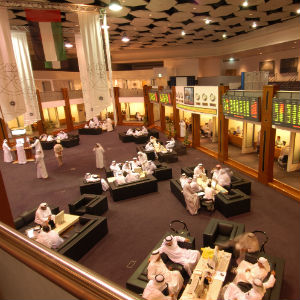Dubai’s Index In Biggest Gain In 3 Weeks
Investors are starting to buy back into the emirate’s stocks following a recent slump.

Dubai’s benchmark made its largest gain in three weeks on Sunday as upbeat global markets spurred investors to buy back into the emirate’s stocks following a recent slump, while other Middle East bourses also rose on similar sentiment.
In Dubai, Emaar Properties climbed three per cent to a four-year high. The developer is the market bellwether and a favourite among fund managers betting on the emirate’s economic recovery, especially as the company diversifies away from real estate and into retail and hospitality.
“Emaar still has room to go up further – we’re seeing more and more buying from foreign institutions,” said a regional trader who declined to be identified.
Dubai’s index rose 1.5 per cent in its biggest gain since Feb. 19. It is down 1.9 per cent from February’s 39-month peak.
“Fundamentally, we’re still looking at a good performance from most companies and we’ve not had yet an influx of liquidity from dividend distributions,” said Mohammed Yasin, managing director of NBAD Securities in Abu Dhabi.
“The market is in a sideways pattern, building support for the next rally, which will hopefully come with dividend pay-outs and first-quarter results from mid-April.”
Arabtec climbed 0.9 per cent to Dhs2.14, trimming its losses to 28 percent since it unveiled plans for a $1.8 billion capital increase.
This will be dilutive to shareholders and will strengthen the grip of top shareholder Aabar, an Abu Dhabi state investment fund, over the builder.
“There’s a lack of confidence in Arabtec now,” said the trader, adding investors will be reluctant to buy Arabtec shares unless the company reconsiders its capital hike.
U.S. and European bourses reached multiyear peaks on Friday, buoying most regional markets as Dubai led gains.
“Dubai’s most sensitive to global market moves,” said Adel Nasr, United Securities brokerage manager in Oman.
Kuwait’s measure rose 0.8 per cent to a two-year high as individual traders again pumped money into small-cap stocks.
The benchmark has gained in 38 of 44 sessions this year and is up 17.3 per cent since November’s eight-year low.
The prolonged rebound means it now reads 91.1 on the relative strength index. A score above 70 usually is seen as over-bought.
Egypt’s index climbed 0.6 per cent, its third straight gain since Tuesday’s 2013 low as traders shrugged off renewed violence over the weekend to buy sold-off stocks. The benchmark has fallen eight per cent since Feb. 5.
“We can’t analyse the market from a technical or fundamental perspective because the political situation is the main driver and we can’t predict what’s going to happen,” said Nasr.
Saudi Arabia’s index fell 0.1 per cent to be down two per cent since mid-January’s eight-month peak and investor sentiment remains shaky.
“Saudi’s Q1 results didn’t excite investors,” said NBAD’s Yasin. “Most importantly, the market is very much reliant on oil price movements. People are starting to rebalance their view on the long-term stability of the Saudi economy.”
This is because of rising domestic consumption of oil and competition from other sources.
U.S. Light Crude has fallen 6.2 per cent since hitting a 2013 peak on Jan. 30, ending Friday at $91.87 a barrel.
